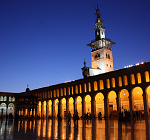Rumours are rife in Damascus that the anti-Bashar al-Assad rebel coalition has shifted focus to the city and will enter it by March. This may well happen. The U.S., fed up of diplomacy with the Geneva-II conference on Syria, has reportedly acquiesced to a free rein for intensified covert operations. Reports that the Barack Obama administration has given the green signal to Saudi Arabia to give the rebels heavy weapons, including anti-aircraft shoulder-fired missiles, are adding to the rumours.
Should covert operations take off, the resulting carnage and destruction will be unprecedented and irrevocable. It is imperative to stop this from happening. Just as the heritage of Paris was preserved from wreckage by the Nazis, the international community must save Damascus. Beyond the incalculable loss of innocent lives – the count has reached more than 100,000 since 2011 – the destruction of the city’s priceless heritage will be a tragedy surpassing even the demolition of the Bamiyan Buddhas by the Taliban in Afghanistan in 2001.
Damascus is one of the oldest continuously inhabited cities in the world, and the cultural and religious centre of the Levant or eastern Mediterranean region, located at the heart of West Asia. It has nurtured three religions – Judaism, Christianity and Islam. The Umayyad mosque, in the centre of the old city, has been successively hallowed ground for all three religions. The Jesus minaret of the mosque is unique – the only one in the world with a six-pointed Star of David. The shrine in the mosque to St. John the Baptist, revered in Islam as Yahiya, has a multi-denominational following. The mosque is a place of pilgrimage for both the Sunni and the Shia. The Straight Street is mentioned in Genesis 14:15 as the road in Damascus where St. Paul saw the light.
All these landmarks are a living heritage, a symbol of this all-encompassing ethos. All of us, as a human civilization, risk losing this collective legacy if we fail to stop the impending destruction of Damascus.
So far, Damascus’s tolerant ethos made the city, and Syria, a haven for its diverse minorities. It was the only country in the violence-hit region from which minorities – both Christian and Muslim – were not fleeing government-inspired targeting and violence.
But this ethos has eroded over the last three years. Now, Syria could be steadily disintegrating under the accelerating takeover of the rebels by Al-Qaeda franchises like the Islamic State of Iraq and the Levant, and the Jabhat al-Nusrah Front. The entry of these groups into Damascus will trigger a sectarian blood-bath, destroy the enduring symbols of Syrian egalitarianism and ecumenism, and mark the end of West Asia as we know it.
Numerous reasons may compel the departure of the Assad regime, but it cannot be faulted for not preserving Damascus. I have visited Damascus twice since the conflict started. So far, its unparalleled heritage is intact. The same cannot be said of Hama, Homs and the legendary city of Aleppo – all of which have by now been substantially destroyed by violence.
The Assad regime has demonstrated its staying power by controlling the levers of power – the army, the Baath party, and the trade guilds. It will not go without a fight. At the same time, the continuing civil war has taken a toll on the anti-Assad rebel coalition, making it fractious and susceptible to the growing strength of Sunni extremist groups. Israel is conscious that the Al-Qaeda linked groups may threaten its own security, while the western powers fear a “blowback” of terror in Europe. On February 25, the British police arrested a former Guantanamo Bay detainee and three others for suspected terror offences relating to Syria – and this could be a foretaste of the future.
To follow-up the ongoing, though unproductive, Geneva-II conference, it is imperative that the forces on both sides of the divide, led by the U.S. and Russia, get all parties to declare Damascus a neutral weapons-free zone and vote in favour of a UN force to ensure the neutrality and peace of this zone.
If this is not done, our failure to collectively address the impending disaster will result in the destruction of Damascus. It could also spread the violence to Syria’s neighbours – Jordan, Iraq, Turkey, Lebanon and Israel. The international community must clearly and emphatically take a stand right now: “Assad: maybe. Damascus: never.”
Rajendra Abhyankar is Visiting Professor, School of Public and Environmental Affairs, Indiana University, U.S.; he was India’s Ambassador to Syria from 1992 to 1996.
This blog was exclusively written for Gateway House: Indian Council on Global Relations. You can read more exclusive content here.
For interview requests with the author, or for permission to republish, please contact outreach@gatewayhouse.in.
© Copyright 2014 Gateway House: Indian Council on Global Relations. All rights reserved. Any unauthorized copying or reproduction is strictly prohibited.


